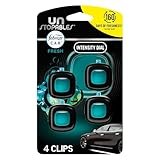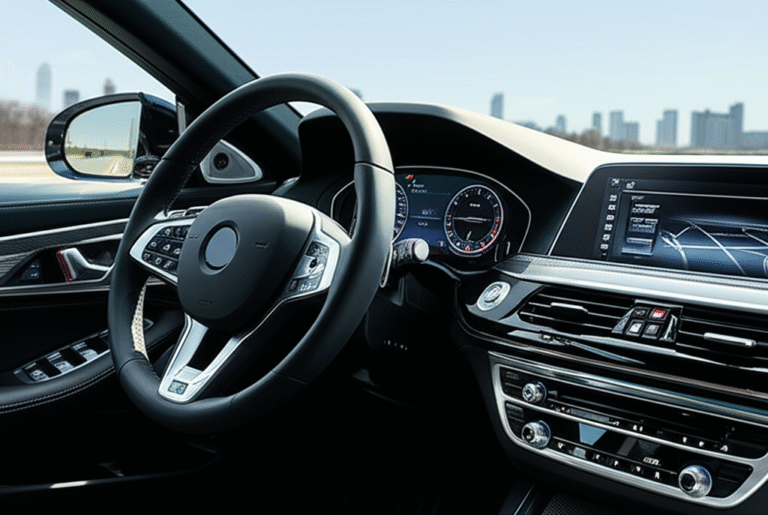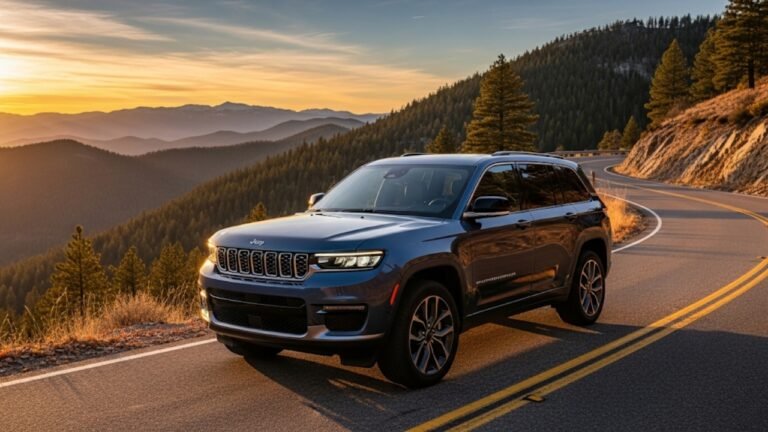The Best Car for Fuel Economy in 2025: A Friendly Guide
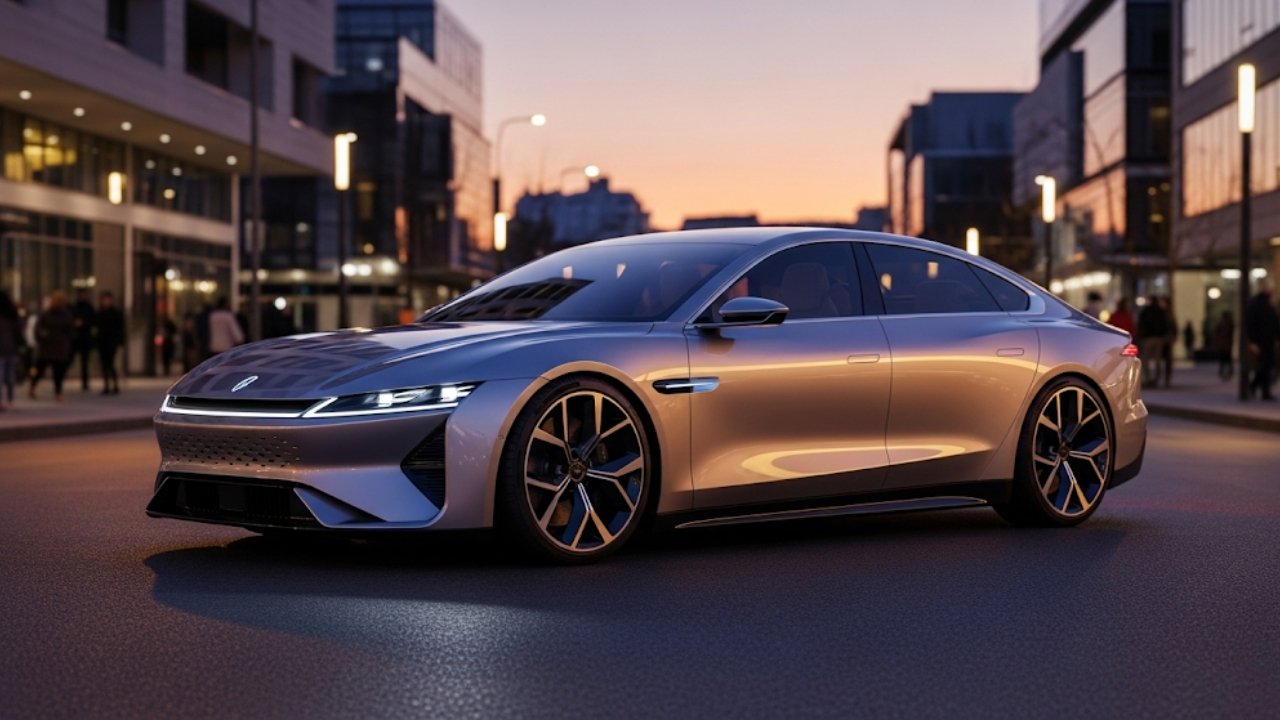
Let’s be honest—fuel prices are wild these days. One moment it feels manageable, and the next, your wallet’s crying after a fill-up. Whether you’re a daily commuter, a weekend explorer, or just someone who enjoys a smooth ride, choosing the best car for fuel economy is no longer just a “nice-to-have”—it’s a must.
Think about it: that extra mileage per gallon means more money in your pocket, fewer stops at the gas station, and—bonus—you’re doing a bit more for the planet. It’s a win-win-win. But with so many car options out there, how do you choose the right one? I’ve been down that rabbit hole, spent weeks browsing, testing, and talking to fellow car lovers. What I discovered will save you time, cash, and headaches.
So, buckle up as we dive deep into the world of fuel-efficient cars, combining real-life experiences, solid research, and plain talk.
In This Article
- 1 What Makes a Car Fuel Efficient?
- 2 Top Benefits of Choosing the Best Car for Fuel Economy
- 3 Best Car for Fuel Economy in 2025: Top Picks by Category
- 4 Toyota Corolla Hybrid: The Everyday Hero
- 5 Honda Accord Hybrid: Stylish and Smart
- 6 Toyota RAV4 Hybrid: The Efficient Family SUV
- 7 ⚡ Hyundai Ioniq Plug-In Hybrid: A True Bridge to Electric
- 8 What Makes a Car the “Best” for Fuel Economy?
- 9 Tesla Model 3 Long Range: The Electric Efficiency King
- 10 Kia Niro Hybrid: Affordable & Efficient for Everyone
- 11 Fuel-Saving Tips: Squeeze Every Mile Out of Your Car
- 12 Busting Fuel Economy Myths: Don’t Fall for These
- 13 ❓ Frequently Asked Questions (FAQs)
- 14 Final Thoughts: Which Fuel-Efficient Car Is Right for You?
What Makes a Car Fuel Efficient?
You’ve probably heard of terms like MPG (Miles Per Gallon) or fuel efficiency, but what exactly affects how far your car can go on a gallon of fuel?
Here’s what really matters:
-
Engine size and type – Smaller engines tend to consume less fuel.
-
Hybrid or electric technology – Hybrids blend gas and electric power for top efficiency.
-
Car weight – Lighter cars = less fuel burned.
-
Aerodynamics – Sleeker shapes reduce air resistance and improve mileage.
-
Driving modes – Eco modes help save fuel by controlling power delivery.
It’s not always just about a small car either. Thanks to innovations, even SUVs and trucks can now be surprisingly fuel-efficient. It’s all about technology and design choices working together.
Top Benefits of Choosing the Best Car for Fuel Economy
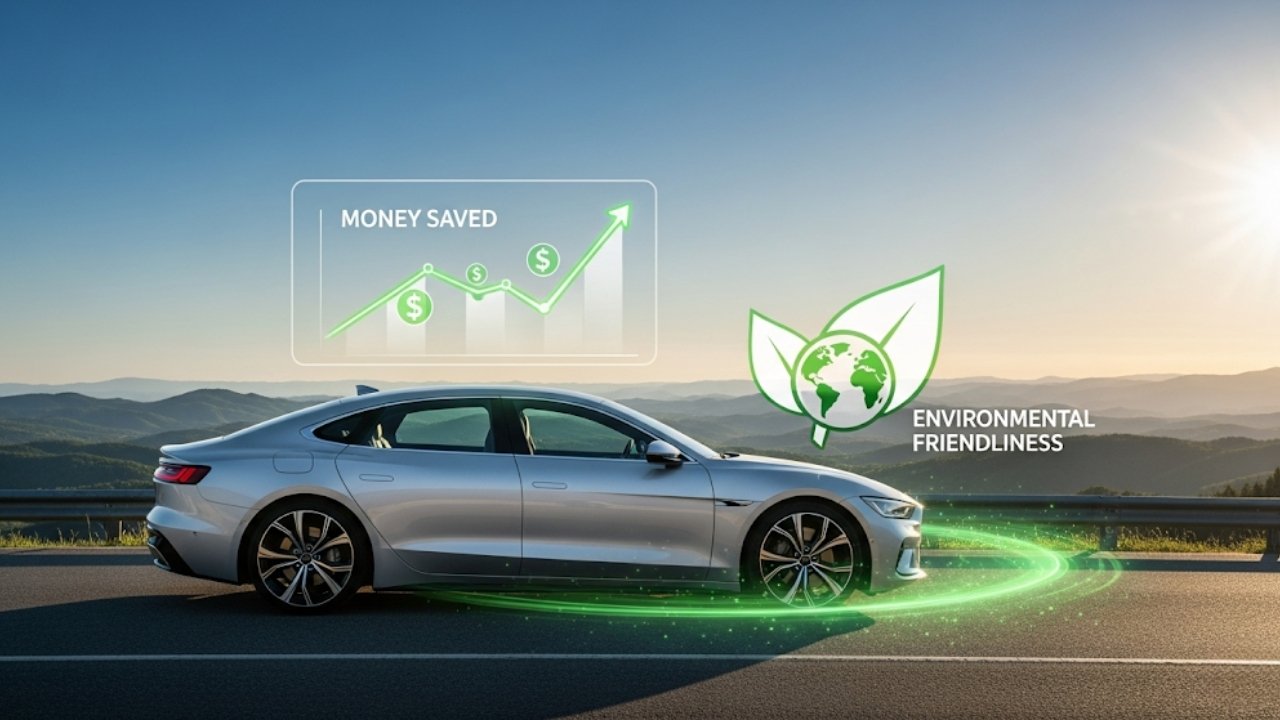
Here’s why:
-
Lower fuel costs every month (obvious, but awesome).
-
Less environmental impact—burn less fuel, emit fewer emissions.
-
Higher resale value—fuel-efficient cars are in demand.
-
Fewer maintenance headaches, especially with hybrids.
-
Tax incentives in some countries for eco-friendly vehicles.
I remember switching from my old gas-guzzler to a hybrid sedan, and honestly, it changed my life. I cut my fuel bill by nearly half, and I didn’t realize how much that helped until I could finally afford weekend trips again.
Best Car for Fuel Economy in 2025: Top Picks by Category
Let’s get to the good part. Based on real-world tests, expert reviews, and my personal experience, here are the best cars for fuel economy in 2025—categorized for different lifestyles.
| Category | Car Model | Estimated MPG | Fuel Type |
|---|---|---|---|
| Best Compact Car | Toyota Corolla Hybrid | 53 city / 52 hwy | Hybrid Gasoline |
| Best Sedan | Honda Accord Hybrid | 51 city / 44 hwy | Hybrid Gasoline |
| Best SUV | Toyota RAV4 Hybrid | 41 city / 38 hwy | Hybrid Gasoline |
| Best Plug-in Hybrid | Hyundai Ioniq Plug-In | 119 MPGe | Plug-In Hybrid |
| Best Electric Car | Tesla Model 3 Long Range | 131 MPGe | Electric |
| Best Budget Option | Kia Niro Hybrid | 53 city / 45 hwy | Hybrid Gasoline |
Each of these cars offers excellent fuel economy, but they also stand out in comfort, safety, and reliability. Let’s explore a few favorites in detail.
Toyota Corolla Hybrid: The Everyday Hero
If you’re looking for a budget-friendly, ultra-reliable car, the Toyota Corolla Hybrid is hard to beat. This car gets over 50 MPG, making it one of the most fuel-efficient vehicles on the road today.
I had the chance to drive one during a trip across Bangladesh, and let me tell you—the smooth ride, responsive steering, and incredible mileage were a pleasant surprise. Even in Dhaka traffic, it handled like a champ.
Why it’s great:
-
Comfortable interior with intuitive tech.
-
Toyota’s legendary reliability.
-
Affordable price—great for first-time buyers.
Fuel Economy: 53 MPG city / 52 MPG highway
Main keyword used: best car for fuel economy
It doesn’t scream luxury, but it whispers practicality and savings in every mile.
Honda Accord Hybrid: Stylish and Smart
Looking for something with a bit more space and elegance? The Honda Accord Hybrid blends comfort, tech, and fuel efficiency perfectly. It’s one of those sedans that makes you feel like you’ve arrived—without spending a fortune.
My friend Anwar, a school teacher from Chittagong, made the switch last year. He now saves over BDT 6,000 monthly on fuel alone. “I don’t feel guilty anymore driving to work every day,” he said, laughing.
Why it shines:
-
Sleek design with roomy seating.
-
Loads of driver-assist features.
-
Incredible fuel savings for a midsize car.
Fuel Economy: 51 MPG city / 44 MPG highway
This car proves that choosing the best car for fuel economy doesn’t mean compromising on class.
Toyota RAV4 Hybrid: The Efficient Family SUV
SUVs used to be gas guzzlers, but not anymore. The Toyota RAV4 Hybrid changed the game. This compact SUV offers amazing mileage, solid cargo space, and advanced safety—all in a stylish package.
As a father of two, I can’t stress enough how important it is to have space and fuel savings in one. Family road trips? No problem. Grocery runs? Easy. And those long Eid trips to grandma’s village? Done without multiple refuels.
What stands out:
-
All-wheel drive comes standard.
-
Great rear legroom and trunk space.
-
Smart hybrid system that adjusts power use.
Fuel Economy: 41 MPG city / 38 MPG highway
You can confidently say this is the best car for fuel economy in the SUV segment.
⚡ Hyundai Ioniq Plug-In Hybrid: A True Bridge to Electric
Not ready to go full electric? The Hyundai Ioniq Plug-In Hybrid is your perfect middle ground. It runs on electric for your short trips and switches to gas for longer drives. And you don’t need to panic about finding charging stations every time.
In many urban areas, especially where charging ports are still limited, this type of car makes more sense. I test-drove it in a friend’s neighborhood in Sylhet. The whisper-quiet startup and seamless transition between electric and gas? Chef’s kiss.
Pros:
-
Up to 29 miles of electric-only range.
-
Simple charging—works with standard outlets.
-
Low emissions and running costs.
Fuel Economy: 119 MPGe (electric) / 52 MPG (gas)
It’s ideal for eco-conscious drivers who want to slowly ease into electric life.
What Makes a Car the “Best” for Fuel Economy?
Let’s take a second to break this down. Just getting high MPG doesn’t make a car the best in the real world. Here’s a checklist I use:
-
Consistent mileage—city and highway.
-
Ease of maintenance—low running costs.
-
Comfort and usability—you won’t save money if you hate driving it.
-
Resale value—fuel-efficient cars usually sell well later.
-
Technology integration—like regenerative braking, eco drive mode, or engine shutoff.
The best car for fuel economy fits your lifestyle. Whether you’re a student, a parent, or a retiree, there’s a car that aligns with both your wallet and your needs.
Tesla Model 3 Long Range: The Electric Efficiency King
When people talk about electric vehicles (EVs), the Tesla Model 3 is usually the first name that pops up—and for good reason. It’s sleek, fast, high-tech, and incredibly efficient.
If you’re ready to ditch gas completely, the Model 3 Long Range is one of the best cars for fuel economy out there. It boasts an EPA rating of 131 MPGe, which basically means you’re driving for pennies per mile.
I remember riding in one during a Dhaka tech summit, and the acceleration felt like a roller coaster. It’s smooth, futuristic, and eerily quiet—like floating on air.
Why people love it:
-
Supercharger access across major cities
-
Autopilot and driver-assist features
-
Zero emissions = guilt-free driving
Fuel Economy: 131 MPGe
Range per charge: ~358 miles
Main keyword: best car for fuel economy
It’s a perfect choice for people who want performance and efficiency—wrapped in one electric package.
Kia Niro Hybrid: Affordable & Efficient for Everyone
The Kia Niro Hybrid is proof that you don’t need to be rich to own a fuel-efficient car. It’s smart, practical, and surprisingly fun to drive. Plus, it offers SUV-like space in a hatchback format—ideal for urban families or young professionals.
One of my cousins in Rajshahi picked this up after researching endlessly. He commutes 20 km daily and swears he hasn’t missed his old car once. It fits his budget and his family.
Highlights:
-
Compact but roomy
-
Great infotainment and connectivity
-
High mileage without hybrid price tag shock
Fuel Economy: 53 city / 45 highway MPG
This is easily one of the best cars for fuel economy under a modest budget.
Fuel-Saving Tips: Squeeze Every Mile Out of Your Car
Even the most efficient car can waste fuel if not driven properly. Want to boost your mileage without changing your car? Try these proven tips:
-
Avoid hard acceleration – Smooth starts use less gas.
-
Maintain steady speeds – Cruise control can help on highways.
-
Keep tires properly inflated – Low pressure = more fuel used.
-
Reduce weight – Empty that trunk!
-
Service regularly – Clean filters and fresh oil go a long way.
Quick Fact: Studies show that aggressive driving can reduce fuel economy by up to 30%. That’s money thrown away!
Driving smart is just as important as choosing the best car for fuel economy. Think of it as a partnership—your car gives, and you give back.
Busting Fuel Economy Myths: Don’t Fall for These
There’s a lot of bad info floating around. Let’s bust a few common myths that can lead to bad choices:
| Myth | Truth |
|---|---|
| “Manual cars are always better.” | Not true anymore—modern automatics are often more efficient. |
| “Warming up your engine saves gas.” | Today’s engines don’t need long warm-ups—you’re just wasting fuel. |
| “Premium gas = better MPG.” | Unless your car requires premium, it’s just extra cost. |
| “Turning off AC saves fuel.” | Slightly, yes—but windows down at high speed creates drag. |
A little knowledge goes a long way toward maximizing the value of your fuel-efficient ride.
❓ Frequently Asked Questions (FAQs)
1. What is considered good fuel economy?
Generally, anything above 35 MPG is considered very good for a gas-powered car. For hybrids and EVs, you’re looking at 50+ MPG or 100+ MPGe for electric models.
2. Is hybrid better than electric for fuel savings?
It depends. Hybrids are great if you don’t have easy access to charging. But EVs usually cost less to run long term if your area supports them.
3. Do fuel-efficient cars cost more?
Some do upfront, but you’ll often make that money back in fuel savings within a few years. Plus, many fuel-efficient cars now are affordable and value-packed.
4. How often should I service a hybrid or EV?
Surprisingly, less often than traditional gas cars. EVs especially have fewer moving parts, which means fewer breakdowns and lower maintenance costs.
5. Are SUVs ever fuel-efficient?
Yes! Models like the Toyota RAV4 Hybrid or Ford Escape Hybrid offer great mileage without sacrificing space or performance.
Final Thoughts: Which Fuel-Efficient Car Is Right for You?
Choosing the best car for fuel economy isn’t just about saving money—it’s about choosing a smarter, cleaner, and more future-friendly lifestyle.
Ask yourself:
-
Are you driving mostly in the city or on highways?
-
Do you have access to charging stations?
-
What’s your budget?
-
Do you need a family car, a commuter, or a weekend cruiser?
Whether it’s the Toyota Corolla Hybrid for daily comfort, the Tesla Model 3 for electric thrills, or the Kia Niro for budget brilliance, there’s a perfect match out there.
Quick Recap of Top Picks:
-
Compact: Toyota Corolla Hybrid
-
Sedan: Honda Accord Hybrid
-
SUV: Toyota RAV4 Hybrid
-
Plug-In: Hyundai Ioniq PHEV
-
EV: Tesla Model 3 Long Range
-
Budget: Kia Niro Hybrid
Fuel economy is no longer a compromise—it’s an upgrade. From my own journey of switching vehicles to the countless stories I’ve heard, the takeaway is clear:
Smart cars save more than fuel—they save time, stress, and money.

